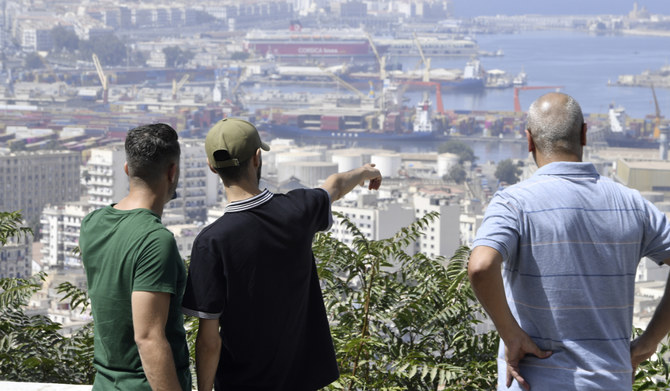ALGIERS: A few years after taking to the streets with hundreds of thousands of other Algerians, Kaci Taher says he feels so disengaged that he will not even vote in the country’s presidential elections next month.
The 28-year-old from Kabylia is precisely the kind of voter that President Abdelmadjid Tebboune has targeted as he vies for a second term in office, describing himself as a “candidate of youth” in his campaign announcement last month.
Most of the young people who make up more than half of the population in Algeria are so disenchanted that, like Taher, they may not vote in next month’s presidential election.
FASTFACT
Voter turnout has long been low in Algeria, particularly among people under 30, who make up 51 percent of the population, according to the National Statistics Bureau.
Though he is almost certain to win, a low turnout could doubt the legitimacy of Tebboune’s victory.
“Voting has no meaning in Algeria like in the big democracies,” he said.
“Where I come from, the results and quotas are fixed in advance in the back room of the government, so what’s the point of taking part in the electoral farce?”
Taher said he is politically suffocating and has little confidence in elections securing the type of democratic outcome that people demanded in 2019.
In that year, massive street protests throughout the country known as the Hirak led to the ouster of octogenarian President Abdelaziz Bouteflika after two decades leading Algeria, Africa’s largest nation by area and a key security partner for Western nations.
Like many young people in Algeria, Taher struggles with unemployment, boredom, and malaise.
Voter turnout has long been low in Algeria, particularly among people under 30, who comprise 51 percent of the population, according to the country’s National Statistics Bureau.
Though little data exists on why people in Algeria abstain from voting, experts say that the aging political elite — including politicians who wrested independence from France more than 60 years ago — are not reaching young people.
“There is a big gap between the new generation and the existing political structures — political parties and institutions,” said Redouane Boudjema, a professor at the Algiers Institute of Journalism who has researched youth and social movements.
“Young people no longer identify with the political elites who occupy the public arena.”
Hirak activists like Taher were disappointed when authorities called for quick elections amid protests in 2019. The timeline, demonstrators said, offered little opportunity to reach a consensus on deep reforms, allowing then-74-year-old Tebboune, seen as close to the military, to win in a low-turnout race.
Journalists have faced prosecution throughout his tenure, and the economic challenges afflicting many of the country’s 45 million people have persisted.
The government has juggled competing priorities, trying to combat inflation while maintaining state spending, subsidies, and price controls that keep people afloat.
Tebboune continues to refer to the Hirak movement in speeches in which he overtures disaffected Algerian youth, claiming their voices have been heard and changes implemented.
Now 78, Tebboune is among dozens of leaders far older than most voters scheduled to cast ballots in more than 50 countries this year. In addition to leaders like 81-year-old US President Joe Biden, the discrepancy is particularly pronounced in Africa, the world’s youngest continent home to 11 of the world’s 20 oldest heads of state.
This year’s analysis from the Pew Research Center concluded that countries classified as “not free,” like Algeria, tend to have older leaders.
Tebboune’s changes include the establishment of a national youth council to advise the government to better integrate young people into politics, an electoral law requiring parties to put forth younger candidates, and interest-free loans for tech start-ups.
“Algeria belongs to everyone, and young people must live its present, build its future, get involved in the political process, and leave their mark,” Mustapha Hidaoui, the youth council president, said last month.
But despite an earnest effort from Tebboune and other government officials, the question of whether young people will be persuaded to vote in the election remains to be seen.
If not, there are fears about increasing Algerians voting with their feet.
More than 100 makeshift boats have traversed the Mediterranean Sea from Algeria to southern Spain’s coast this year, according to Francisco Jose Clemente Martin, an active member of the International Center for Migrant Identification.
“Algeria’s over. We’re leaving it to you. Adios!” a group of young Algerians packed into a crowded boat say in a video that has gone viral on social media.


























